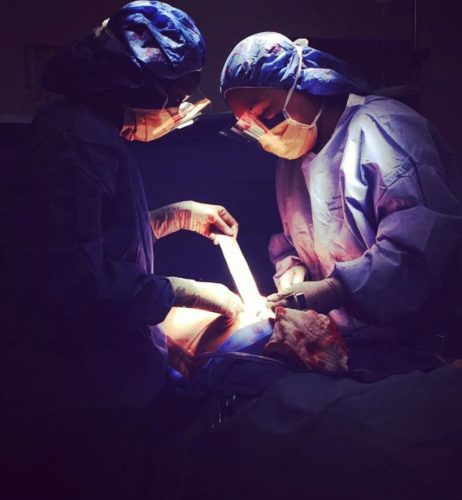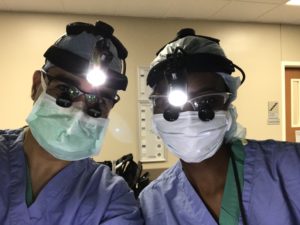 “I had no control over my schedule. I was working 80 hours a week and had many 24-hour shifts,” she said. “So many times I would get home and just pass out because I was so exhausted.”
“I had no control over my schedule. I was working 80 hours a week and had many 24-hour shifts,” she said. “So many times I would get home and just pass out because I was so exhausted.”
The more hectic her schedule became, the more Matemavi learned to depended on God to make it through each day. The opposite happened with her husband and the two grew apart.
“During my third year of residency, we went through a divorce,” Matemavi said. “And that’s the hardest year of your training. For somebody who is a perfectionist – who always has to get As in class – failing at a second marriage was a huge blow.”
The devastation she felt made it difficult to get up each morning. Not only was she dealing with the stress and strain of a failing marriage, she still had to concentrate on operating on patients each day.
She clung to God for survival.
“I had prayed, I had fasted; I had done everything possible to try to save my marriage, and God still said ‘No,’” Matemavi said.
“There are things we don’t realize. We don’t tend to see the whole forest, we only see a single tree. And it’s very difficult when you are going through a hard time to actually look at the big picture.” – Dr. Praise Matemavi
Matemavi pushed through the pain and disappointment but faced another devastating blow a few years later when her mother passed away from inflammatory breast cancer two months before Matemavi was set to graduate from her residency program.
“It was very unexpected. She got sick so fast, and it was such a toil on me because she had been going through this whole journey with me,” Matemavi said. “She was my prayer warrior. I would text her before every surgery, and every time I walked into an operating room, I knew I was covered in prayer.”
Less than a week was all the time Matemavi had to mourn her mother before going back to work. The most difficult part of returning to work was treating patients with the same condition her mother had.
“It was very difficult for me because I’ve taken care of countless women with breast cancer,” Matemavi said. “They’ve practically been cured because of the surgeries I performed, and yet I couldn’t save my own mother.”
Matemavi had planned to retire her mother and wanted her to see the benefits of all the hard work over the years, and finally see her daughter graduate as a surgeon.
What got Matemavi through her dark days was one verse in particular that her father gave her:
“He is the rock, His works are perfect, and all His ways are just. A faithful God who does no wrong, just and upright is He.” – Deuteronomy 32:4
 Two months later, Matemavi graduated from her residency program in June, 2017, and began her transplant surgery fellowship in Omaha, Nebraska, a few months later.
Two months later, Matemavi graduated from her residency program in June, 2017, and began her transplant surgery fellowship in Omaha, Nebraska, a few months later.
Although she had wanted to be a cardiac surgeon for most of her life, Matemavi had decided during her second year as a medical student that she wanted to specialize in transplant surgery.
At the time, she had been reading a book by a pediatric cardiothoracic surgeon and mentioned to an adult cardiothoracic lecturer that she was reading the book and found it interesting how technically challenging the procedures are.
Her lecturer told her that the only other field that is technically comparable or even more difficult than pediatric cardiothoracic surgery is liver transplant surgery.
“In my mind I was imagining these small little hearts and these cardiac surgeons are working on these tiny human beings, and yet this lecturer was telling me that there’s something equally as difficult or possibly even more challenging? I had to look into it more.” – Dr. Praise Matemavi
“I decided there and then that I was going to do the most difficult thing there is to do…whether it was pediatric cardiac surgery or transplant surgery,” Matemavi said.
Transplant surgery intrigued her more.
“I was so fascinated by it – how you can take someone’s organs and place them inside somebody else, and they can have a completely normal life after that,” she said.
Unfortunately transplant surgery offers the worst lifestyle. It has the worst hours and is very challenging with surgeries lasting anywhere from 8-12 hours. As a result, not many doctors go into transplant surgery and it’s a very small community – smaller than most specialties.
“It’s a more taxing job because the operations are more difficult, take so long, and the patients are often the sickest patients,” Matemavi said. “When you do a liver transplant, it’s not uncommon to give a patient 20 units of blood and 20 units of fresh frozen plasma because these patients are so sick, and because their liver has failed, you’re basically resetting everything.”
 Matemavi explained that transplant surgeons often have to recover organs at night because hospitals prefer to use their operating rooms during the day for elective operations. So she often ends up hopping onto a jet and going to recover organs in the middle of the night because that’s when the operating rooms are available.
Matemavi explained that transplant surgeons often have to recover organs at night because hospitals prefer to use their operating rooms during the day for elective operations. So she often ends up hopping onto a jet and going to recover organs in the middle of the night because that’s when the operating rooms are available.
Nonetheless, she wouldn’t trade it for anything.
“That’s what I’ve dreamt of since being a second-year medical student,” she said. “I’ve dreamt of being on jets, being flown all over the country to recover organs and then coming back to transplant them. I always tell my kids, “If you dream it, it’s possible; but you have to be able to put everything you have into it. There will be sacrifices that you’ll have to make to get to where you want to be. But if you put your all into it, there is no reason why you can’t be successful.’”
One thing Matemavi has noticed over the years is that the higher up the ladder she climbs, the fewer women of colour she sees.
“There are less than 10 black female transplant surgeons that are practicing or in fellowship in the entire country,” Matemavi said. “And we all know each other.”
Matemavi said that being black isn’t something that has been an issue for her. However, being a woman has presented its own set of challenges over the years, particularly because she was the only woman in her residency class. One attending doctor once commented that “girls do not belong in an operating room”.
At one point, seeds of doubt began to take root because every time she brought up her plan to specialize in transplant surgery, her medical mentors would try to dissuade her from doing so. They kept telling her how difficult the field is, and soon Matemavi began to wonder if she had what it took to be a transplant surgeon, even though she had scored the highest in her class on all her shelf exams in medical school.
“One of my attendings at the time told me that I was a great doctor and surgeon, but said I should be a breast surgeon because the operations are easier and the lifestyle is better,” Matemavi said. “I thought, ‘Why? He would have never said this to any of the guys.’”
On another occasion, an older and well-respected attending commended her on her intelligence and precision and suggested she become a plastic surgeon because that would be a better fit for her since she is “very particular about everything”.
“Surgery, as a whole, is a very white male-dominated field. As with most other fields, the higher up you go, the more differently you are treated. It’s one of those things where your margin of error is very small and it’s very unfair because your male counterparts can make errors and nobody really wonders about their competence. But as a female, no matter how great you are, whenever you do make a mistake – which happens because no one is perfect – you are judged more harshly.” – Dr. Praise Matemavi
Matemavi said she is undermined the most when she travels to hospitals to recover organs, and the hospital staff automatically start talking to the assistant who accompanies her, who is usually a white male, because they assume he is the surgeon.
“I just let them go ahead because I know they’ll have to come and talk to me eventually so I can tell them what kind of equipment I need and exactly how I want things to go,” she said. “It’s one of those things I’ve had to learn to deal with and it doesn’t bother me much anymore.”
She also gets a lot of comments from patients on how young she looks when she walks into their rooms to introduce herself as the surgeon who will be operating on them…Next Page
Vimbai E. is a content marketer, ghostwriter, and the founder of The Weight She Carries. With hundreds of articles and stories publishing online, in print and for broadcast, her love of language and storytelling shines through every piece of writing that bears her name.
